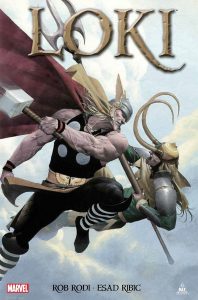 Although I’ve done a little bit of delving into old-school Spider-Man and X-Men, for the most part I’m only barely aware of the Marvel canon, outside what movies have told me. Of course, the comics have lots of advertising and in-story references to the other Marvel characters, so I’m getting a vague idea of what the universe looks like, thanks to the aforementioned excavations. So sure, I know that Thor spent some time as an Avenger (whatever that is), and that his comics frequently refer to Norse legend, which seems only right. But when I got the Marvel-branded book Loki for Christmas, I had no idea if I’d really be able to follow. As it happens, this story pre-supposes no Marvel knowledge at all that I could discern, so yay that! Even yayer, despite saying on the back that it collects Loki #1-4, it’s a completely self-contained story, so I wasn’t stuck wanting to buy future volumes and hope they might come out someday, and so forth. My point is, as far as the presentation, all good.
Although I’ve done a little bit of delving into old-school Spider-Man and X-Men, for the most part I’m only barely aware of the Marvel canon, outside what movies have told me. Of course, the comics have lots of advertising and in-story references to the other Marvel characters, so I’m getting a vague idea of what the universe looks like, thanks to the aforementioned excavations. So sure, I know that Thor spent some time as an Avenger (whatever that is), and that his comics frequently refer to Norse legend, which seems only right. But when I got the Marvel-branded book Loki for Christmas, I had no idea if I’d really be able to follow. As it happens, this story pre-supposes no Marvel knowledge at all that I could discern, so yay that! Even yayer, despite saying on the back that it collects Loki #1-4, it’s a completely self-contained story, so I wasn’t stuck wanting to buy future volumes and hope they might come out someday, and so forth. My point is, as far as the presentation, all good.
So then there’s the part between the covers. The art is amazing, though not entirely comic-like. Rather than contained action on each page, it’s more like a series of paintings. But since the story is a very introspective one, that works well. We open with Loki triumphant, in command of Asgard with all of his foes vanquished and Thor on his knees in chains at Loki’s feet. All that is left is for Loki to get the common people to follow his will, to decide how he will accomplish this, and, part and parcel, to decide what kind of ruler he will be. What follows is 60 or 80 pages of recriminations, impassioned arguments, and bitter tirades as Loki wanders a castle that holds no real meaning for him in itself, trying to apportion blame for his fate, the fate of the other Asgardians, and especially the fate of his brother Thor.
I know it sounds like one of those apologist texts that finds a way to blame other people for one’s own bad actions and decisions. To an extent it is, but only to the extent that Loki sees himself as a victim. The reader is free to make whatever decision they walk away from the text with, as all points of view are given equal time. But anyway, that’s just the sideshow. The burning question, ‘What will Loki do?’ is addressed with measured deliberation and to excellent effect by the story’s end. I don’t know how good this is for people who like Marvel, but I definitely recommend it for people who like Norse mythology.